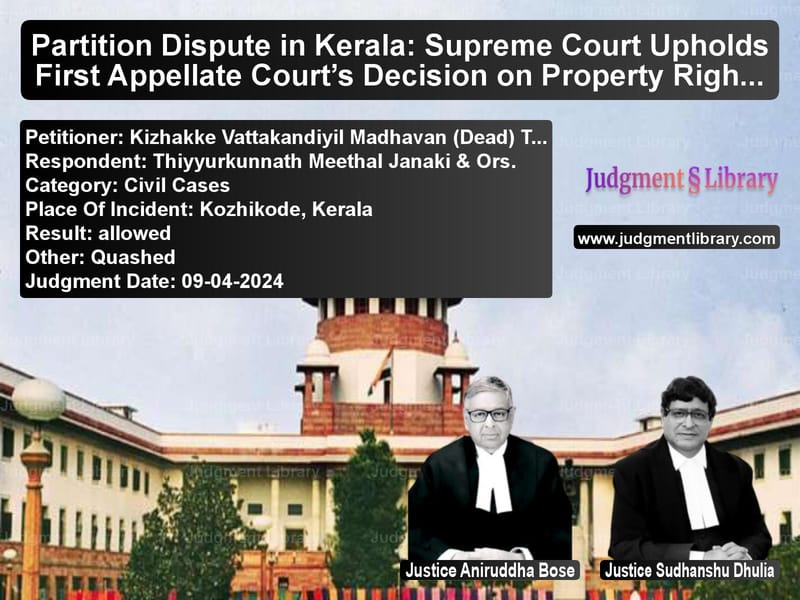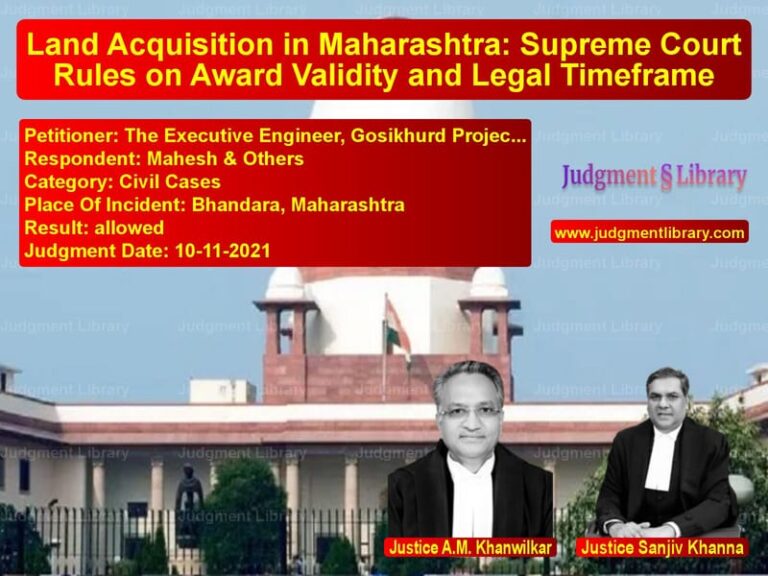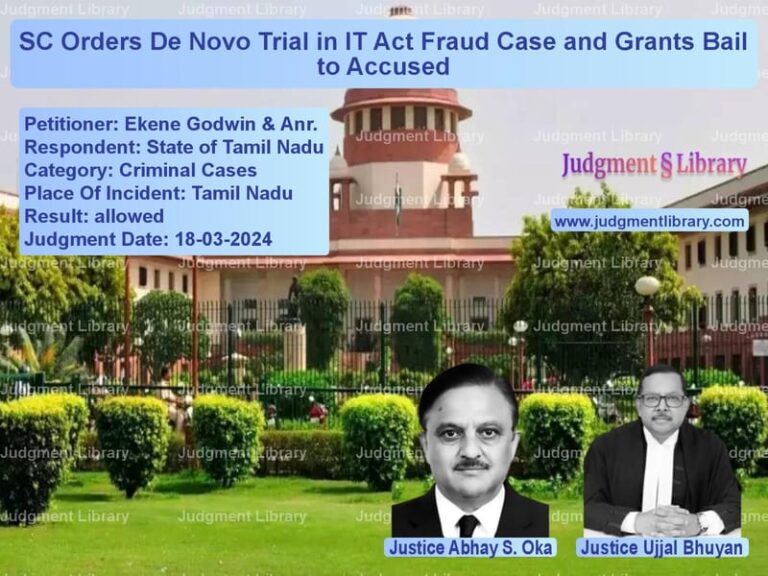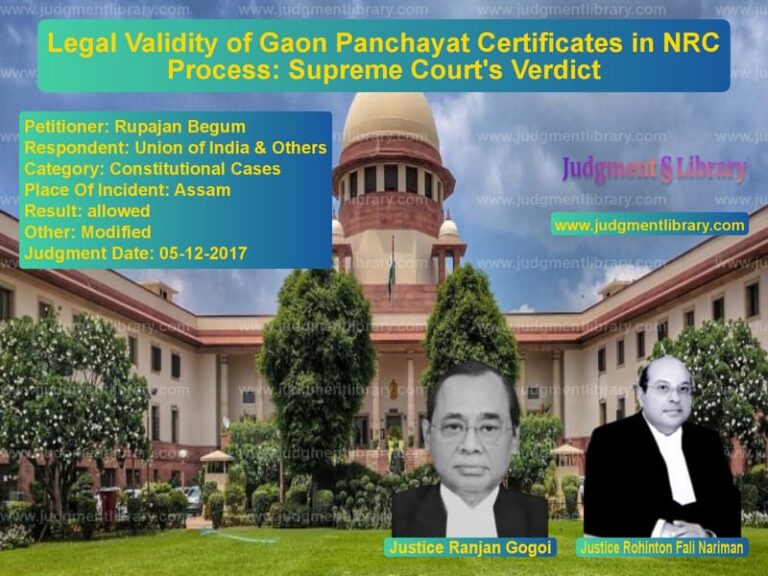Partition Dispute in Kerala: Supreme Court Upholds First Appellate Court’s Decision on Property Rights
The Supreme Court of India, in Kizhakke Vattakandiyil Madhavan (Dead) Through LRs v. Thiyyurkunnath Meethal Janaki & Ors., delivered a significant ruling on April 9, 2024, regarding a long-standing property partition dispute in Kerala. The case revolved around inheritance claims over property situated in Kozhikode, with the primary contention being whether the plaintiff, claiming through his mother, had any legal entitlement to the suit property.
The Court examined multiple historical transactions dating back to the early 20th century, analyzed the impact of the Hindu Widows’ Remarriage Act, 1856, and scrutinized the validity of lease deeds executed by the plaintiff’s mother. Ultimately, the Supreme Court set aside the High Court’s ruling and upheld the First Appellate Court’s judgment, dismissing the claim for partition.
Background of the Case
The suit property, situated in Eravattur village, Kozhikode district, was the subject of a partition suit filed by Thiyyurkunnath Meethal Chandu (plaintiff), who claimed an 8/20 share. The defendants were the successors of Sankaran, a son from the plaintiff’s mother’s first marriage. The property was initially owned by Madhavan, the plaintiff’s mother’s first husband, and his mother Nangeli. After Madhavan’s death, his widow Chiruthey remarried Neelakandan and had Chandu from her second marriage.
The main issue was whether Chandu, as the son of Chiruthey’s second marriage, had any inheritance rights over the property originally owned by Madhavan. The plaintiff contended that the property was in his mother’s possession, making him a legal heir. The defendants argued that Chiruthey lost all rights to her deceased husband’s property upon remarriage under the Hindu Widows’ Remarriage Act, 1856.
Arguments by the Plaintiff
- The plaintiff claimed that his mother, Chiruthey, had valid possession over the property due to multiple lease transactions executed between 1910 and 1925.
- He argued that a lease deed executed on July 14, 1910, in favor of his mother and another individual, Kuttiperavan, granted her legal possessory rights over the property.
- He asserted that a subsequent 1925 deed, through which Kuttiperavan surrendered his share in favor of Chiruthey and Sankaran, further reinforced his mother’s legal right.
- The plaintiff contended that these transactions gave his mother and her heirs a rightful claim to the property.
Arguments by the Defendants
- The defendants argued that the property originally belonged to Madhavan and that, upon his death, his son Sankaran was the rightful heir.
- They cited the Hindu Widows’ Remarriage Act, 1856, which explicitly states that a widow loses all inheritance rights to her deceased husband’s property upon remarriage.
- The defendants contended that the plaintiff’s claim was baseless as his mother had no ownership rights after remarrying Neelakandan.
- They further argued that the lease transactions executed by Chiruthey were invalid since she had no authority to deal with the property.
Key Observations of the Supreme Court
- The Court held that Section 2 of the Hindu Widows’ Remarriage Act, 1856, applied in this case, stating: “On remarriage, all right and interest which any widow may have in her deceased husband’s property shall cease and determine as if she had then died.”
- It ruled that since Madhavan’s mother Nangeli and his son Sankaran were alive at the time of his death, any inheritance rights belonged to them, not to his widow, Chiruthey.
- The Court analyzed the lease transactions and found that the original 1910 lease deed (Exhibit A-1) and its subsequent modifications did not confer ownership rights to the plaintiff’s mother.
- The Court also ruled that any claim by the plaintiff based on these transactions was nullified by the overriding effect of the 1856 Act.
- It stated: “Even if the deeds were valid, the plaintiff’s mother only had possessory rights as a lessee, not ownership rights.”
Supreme Court’s Final Verdict
The Supreme Court set aside the High Court’s judgment and reinstated the First Appellate Court’s ruling, which had dismissed the plaintiff’s suit for partition. The Court held:
“The ownership of the suit property could not be said to have devolved to the plaintiff. The decision of the First Appellate Court is confirmed, and the appeal is allowed.”
It further stated:
“The plaintiff’s mother had no legal authority to claim ownership over the property. Her right, if any, was limited to that of a lessee.”
With this ruling, the plaintiff’s claim to an 8/20 share in the property was completely rejected.
Implications of the Judgment
- This judgment reinforces the principle that a widow loses all rights to her deceased husband’s property upon remarriage under the Hindu Widows’ Remarriage Act, 1856.
- It establishes that lease agreements executed by individuals without legal ownership cannot override inheritance laws.
- The ruling clarifies that mere possession or tenancy rights do not amount to ownership in property disputes.
- It serves as a precedent for cases where property rights are contested on the basis of historical lease transactions.
Conclusion
The Supreme Court’s decision in this case provides much-needed clarity on property inheritance laws, particularly in cases involving widows who remarry. By ruling in favor of the defendants, the Court upheld the principles enshrined in the Hindu Widows’ Remarriage Act, ensuring that legal heirs, rather than remarried widows, inherit ancestral property.
This judgment not only resolves a decades-long dispute but also sets a strong precedent for future cases involving similar claims. It highlights the importance of adhering to statutory inheritance laws and the necessity of clear legal ownership for property transactions.
Petitioner Name: Kizhakke Vattakandiyil Madhavan (Dead) Through LRs.Respondent Name: Thiyyurkunnath Meethal Janaki & Ors..Judgment By: Justice Aniruddha Bose, Justice Sudhanshu Dhulia.Place Of Incident: Kozhikode, Kerala.Judgment Date: 09-04-2024.
Don’t miss out on the full details! Download the complete judgment in PDF format below and gain valuable insights instantly!
Download Judgment: kizhakke-vattakandiy-vs-thiyyurkunnath-meeth-supreme-court-of-india-judgment-dated-09-04-2024.pdf
Directly Download Judgment: Directly download this Judgment
See all petitions in Property Disputes
See all petitions in Landlord-Tenant Disputes
See all petitions in Succession and Wills
See all petitions in Judgment by Aniruddha Bose
See all petitions in Judgment by Sudhanshu Dhulia
See all petitions in allowed
See all petitions in Quashed
See all petitions in supreme court of India judgments April 2024
See all petitions in 2024 judgments
See all posts in Civil Cases Category
See all allowed petitions in Civil Cases Category
See all Dismissed petitions in Civil Cases Category
See all partially allowed petitions in Civil Cases Category







